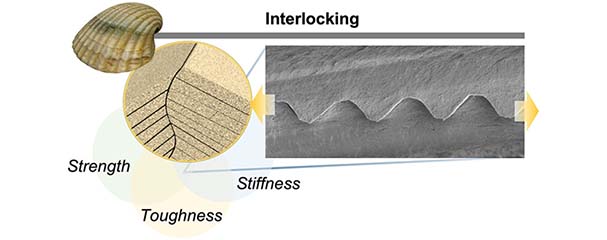New material mimics strength, toughness of mother of pearl
Press Release by American Chemical Society
SUTD - Hemant Kumar Raut, Rupambika Das & Javier G. Fernandez
MIT - Alan F. Schwartzman & Caroline A. Ross
Stony Brook University - Fan Liu & Lifeng Wang

In the summer, many people enjoy walks along the beach looking for seashells. Among the most prized are those that contain iridescent mother of pearl (also known as nacre) inside. But many beachcombers would be surprised to learn that shimmery nacre is one of nature's strongest, most resilient materials.
Now, researchers reporting in ACS Nano have made a material with interlocked mineral layers that resembles nacre and is stronger and tougher than previous mimics.
Some mollusks, such as abalone and pearl oysters, have shells lined with nacre. This material consists of layers of microscopic mineral "bricks" called aragonite stacked upon alternating layers of soft organic compounds.
Scientists have tried to replicate this structure to make materials for engineering or medical applications, but so far artificial nacre has not been as strong as its natural counterpart. Hemant Raut, Caroline Ross, Javier Fernandez and colleagues noticed that prior nacre mimics used flat mineral bricks, whereas the natural material has wavy bricks that interlock in intricate herringbone patterns. They wanted to see if reproducing this structure would create a stronger, tougher nacre mimic for sustainable medical materials.
Using the components of natural nacre, the team made their composite material by forming wavy sheets of the mineral aragonite on a patterned chitosan film. Then, they interlocked two of the sheets together, filling the space between the wavy surfaces with silk fibroin. They stacked 150 interlocked layers together to form a composite that was about the thickness of a coin.
The material was almost twice as strong and four times as tough as previous nacre mimics -- close to the strength and toughness reported for natural nacre. The artificial nacre was also biocompatible, which the researchers demonstrated by culturing human embryonic stem cells on its surface for one week. These features suggest that the material could be suitable for sustainable, low-cost medical uses, the researchers say.
Reference:
Tough and Strong: Cross-Lamella Design Imparts Multifunctionality to Biomimetic Nacre, ACS Nano, (DOI: 10.1021/acsnano.0c01511)
Acknowledgements:
The authors acknowledge funding from the Singapore University of Technology and Design and the National Research Foundation, Singapore.